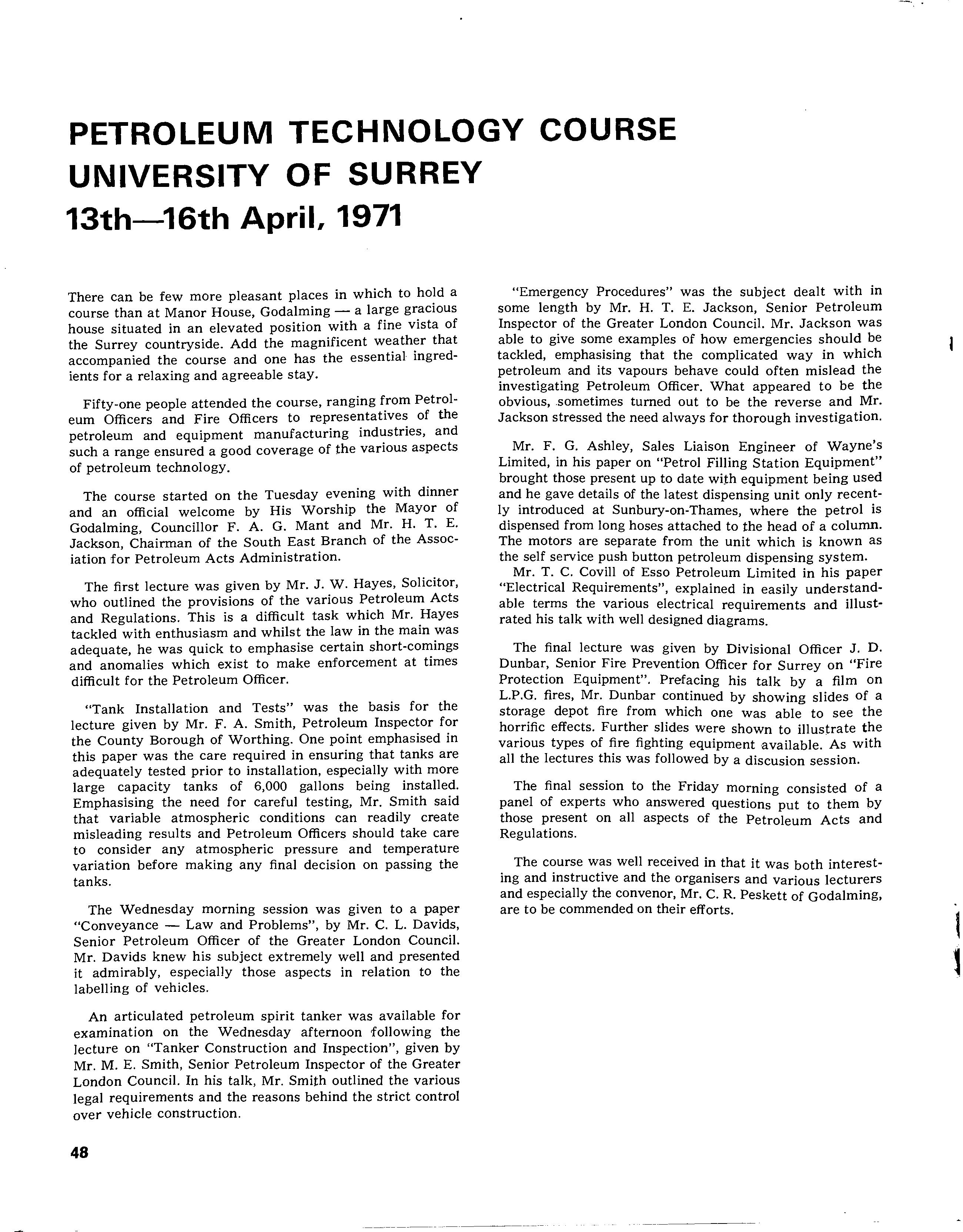
3 minute read
Southern Course
by apeauk
PETROLEUM TECHNOLOGY COURSE UNIVERSITY OF SURREY 13th-16th April, 1971
There can be few more pleasant places in which to hold a course than at Manor House, Godalming - a large gracious house situated in an elevated position with a fine vista of the Surrey countryside. Add the magnificent weather that accompanied the course and one has the essential ingredients for a relaxing and agreeable stay.
Advertisement
Fifty-one people attended the course, ranging from Petroleum Officers and Fire Officers to representatives of the petroleum and equipment manufacturing industries, and such a range ensured a good coverage of the various aspects of petroleum technology.
The course started on the Tuesday evening with dinner and an official welcome by His Worship the Mayor of Godalming, Councillor F. A. G. Mant and Mr. H. T. E. Jackson, Chairman of the South East Branch of the Association for Petroleum Acts Administration.
The first lecture was given by Mr. J. W. Hayes, Solicitor, who outlined the provisions of the various Petroleum Acts and Regulations. This is a difficult task which Mr. Hayes tackled with enthusiasm and whilst the law in the main was adequate, he was quick to emphasise certain short-comings and anomalies which exist to make enforcement at times difficult for the Petroleum Officer.
"Tank Installation and Tests" was the basis for the lecture given by Mr. F. A. Smith, Petroleum Inspector for the County Borough of Worthing. One point emphasised in this paper was the care required in ensuring that tanks are adequately tested prior to installation, especially with more large capacity tanks of 6,000 gallons being installed. Emphasising the need for careful testing, Mr. Smith said that variable atmospheric conditions can readily create misleading results and Petroleum Officers should take care to consider any atmospheric pressure and temperature variation before making any final decision on passing the tanks.
The Wednesday morning session was given to a paper "Conveyance - Law and Problems", by Mr. C. L. Davids, Senior Petroleum Officer of the Greater London Council. Mr. Davids knew his subject extremely well and presented it admirably, especially those aspects in relation to the labelling of vehicles.
An articulated petroleum spirit tanker was available for examination on the Wednesday afternoon following the lecture on "Tanker Construction and Inspection", given by Mr. M. E. Smith, Senior Petroleum Inspector of the Greater London Council. In his talk, Mr. Smith outlined the various legal requirements and the reasons behind the strict control over vehicle construction.
"Emergency Procedures" was the subject dealt with in some length by Mr. H. T. E. Jackson, Senior Petroleum Inspector of the Greater London Council. Mr. Jackson was able to give some examples of how emergencies should be tackled, emphasising that the complicated way in which petroleum and its vapours behave could often mislead the investigating Petroleum Officer. What appeared to be the obvious, sometimes turned out to be the reverse and Mr. Jackson stressed the need always for thorough investigation.
Mr. F. G. Ashley, Sales Liaison Engineer of Wayne's Limited, in his paper on "Petrol Filling Station Equipment" brought those present up to date with equipment being used and he gave details of the latest dispensing unit only recently introduced at Sunbury-on-Thames, where the petrol is dispensed from long hoses attached to the head of a column. The motors are separate from the unit which is known as the self service push button petroleum dispensing system.
Mr. T. C. Covill of Esso Petroleum Limited in his paper "Electrical Requirements", explained in easily understandable terms the various electrical requirements and illustrated his talk with well designed diagrams.
The final lecture was given by Divisional Officer J. D. Dunbar, Senior Fire Prevention Officer for Surrey on "Fire Protection Equipment". Prefacing his talk by a film on L.P.G. fires, Mr. Dunbar continued by showing slides of a storage depot fire from which one was able to see the horrific effects. Further slides were shown to illustrate the various types of fire fighting equipment available. As with all the lectures this was followed by a discusion session.
The final session to the Friday morning consisted of a panel of experts who answered questions put to them by those present on all aspects of the Petroleum Acts and Regulations.
The course was well received in that it was both interesting and instructive and the organisers and various lecturers and especially the convenor, Mr. C. R. Peskett of Godalming, are to be commended on their efforts.







